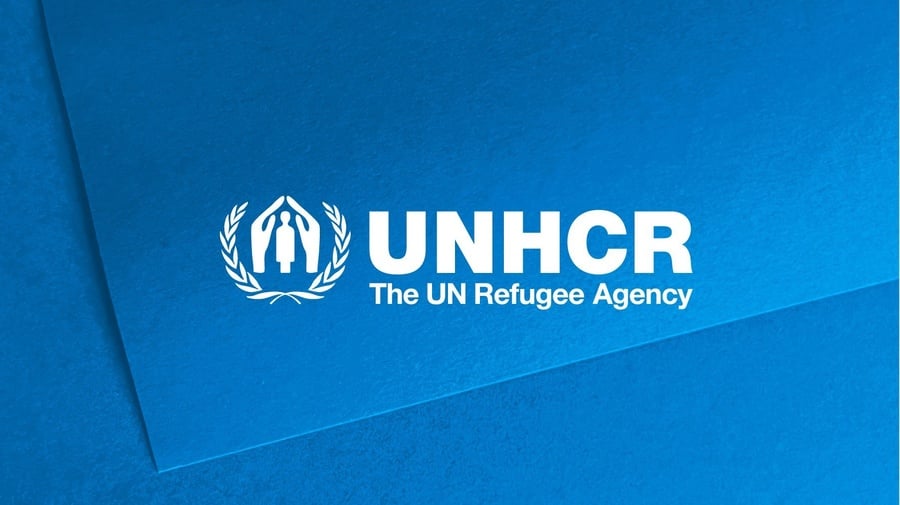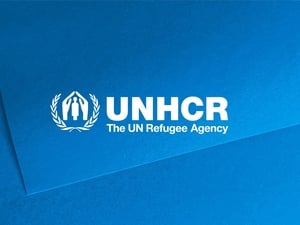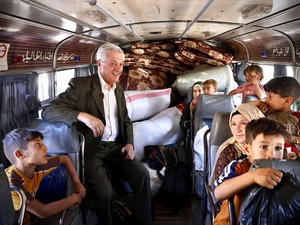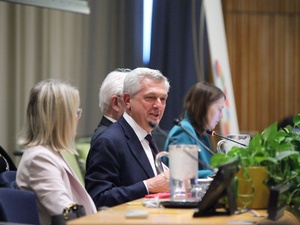High Commissioner’s statement at the Brussels Syria Conference
High Commissioner’s statement at the Brussels Syria Conference

Thank you, Chair.
In the past few months, all eyes have been on Gaza — and rightly so.
It is crucial that – at the same time – we do not forget other unresolved crises, like Syria. The war in Gaza is also a tragic reminder of what happens when a conflict (and by extension a refugee crisis) is left unattended.
Geir Pedersen has spoken earlier today of the political context. It is crucial that all continue to support his efforts and UNSCR 2254. Equally urgent is to remember that the conflict which started 13 years ago has produced a persistent humanitarian crisis – including, as was mentioned many times this afternoon – massive, unresolved displacement, with 5.6 million Syrian refugees still in the region.
They need your support. But above all their plight needs a solution.
The question of how to solve the Syrian refugee crisis has come and gone in the volatile political debate for years. The return of refugees to Syria was a central item in last year’s discussions within the League of Arab States and the important advocacy by the Arab Contact Group. We also had a number of discussions with European and Arab countries and it has been, as we have heard, much debated for years, particularly Lebanon. And it has surfaced in Europe in the last few months, prompted by the arrival of Syrian refugees on the shores of the European Union, particularly in Cyprus.
UNHCR’s position is and has remained clear and consistent, defined by international protection standards and the concerns of refugees, not by political expediency. Syrian refugees must be protected wherever they are. They and their hosts must be supported. But when refugees choose to return to Syria – voluntarily, safely, and with dignity, as is their right – they, too, must be helped.
And what do Syrian refugees tell us? UNHCR’s surveys show that the majority still want to return home eventually but add that different sets of obstacles continue to prevent many of them from doing so. Some relate to security fears or legal and other impediments; some are of a material or economic nature.
It is only the Government of Syria – as I discussed last year with President Assad – that can address the first set of obstacles. It is their responsibility. I hope that all have taken note of the important policy statements that the Government has made in this respect, including at the UNHCR Executive Committee meeting last October. Some concrete steps have also been taken to respond to the security of returnees, address legal challenges and allow UNHCR to monitor repatriation, including through increased presence at the border and in returnee areas. This work needs to continue in order to rebuild the confidence of refugees and address their fears – from military conscription, to housing, land and property challenges, to guarantees for rights and personal safety. UNHCR is engaging and will remain engaged to see these issues fully addressed.
The other set of obstacles concerns – fundamentally – Syria’s dire humanitarian situation. Refugees will not return in large numbers if there is no work; if their homes remain destroyed; if health and education facilities are inadequate. It was positive when – in 2022 – the Security Council authorized early recovery activities to be supported in Syria. However, resources have been insufficient to create basic conditions that would make returns sustainable. This was clear to us just a few days ago as we monitored the voluntary return of some 228 individuals from Lebanon. Such support must be expanded and accelerated, with a specific focus on areas of return.
But even under the best circumstances, progress will be incremental, with countries neighbouring Syria hosting refugees for some years to come. That is why the dramatic decline of donor support is of utmost concern. Reduced funding, as we heard this morning from the Jordanian Foreign Minister, especially in Jordan and Lebanon, undermines the ability of host countries to protect refugees while supporting their own citizens. In parallel, reduced funding for early recovery inside Syria undermines the possibility of voluntary return, further frustrating host countries whose patience, as we heard from the Foreign Minister of Lebanon, was exhausted years ago.
Lebanon, as we heard, in particular is facing an almost existential crisis of survival as a nation, made even more challenging by the long-term stay of refugees – its situation needs special and urgent attention. We should not forget that Lebanon, and Jordan, are also impacted by the Gaza conflict. Both, along with Iraq, Egypt and Türkiye – which alone protects several millions of refugees – deserve more concrete support.
I recognize the scale and seriousness of the host countries’ predicament. I ask them to continue to protect refugees; and I want to explicitly reiterate the commitment of UNHCR to engage with all host countries to find the most practical way forward to protect Syrians. I ask that they do all they can to stop, rather than inflame, anti-refugee rhetoric and actions. This crisis is not the fault of the Syrian refugees.
But donors, and European countries in particular, must not take the patience of hosts for granted. Praising them is inadequate if resources are decreasing. And with that decline – inevitably, and as we already witness – will come secondary movements of refugees towards Europe. Remember, please, 2015.
I hope my message today is clear: resorting to artificial formulas like defining certain areas of Syria safe for returns will not address the problem. If we are serious about solving the Syrian refugee question through just, sustainable, voluntary returns, both the internal, confidence building track, and the external, material support track must be pursued much more decisively by concerned stakeholders.
We need to be guided by a committed and strategic long-term partnership between the international community and host countries, not by short-sighted political dynamics. I ask you to substantially scale up your support inside Syria through the HRP and early recovery activities; to restore funding to the 3RP – the refugee programme – to adequate levels in addition to your bilateral development support to host countries; expand resettlement places; and, ultimately, but very importantly support Geir’s political track.
We cannot, especially at this moment, afford to neglect another crisis, or it will come back to haunt us for decades to come.
Thank you.







